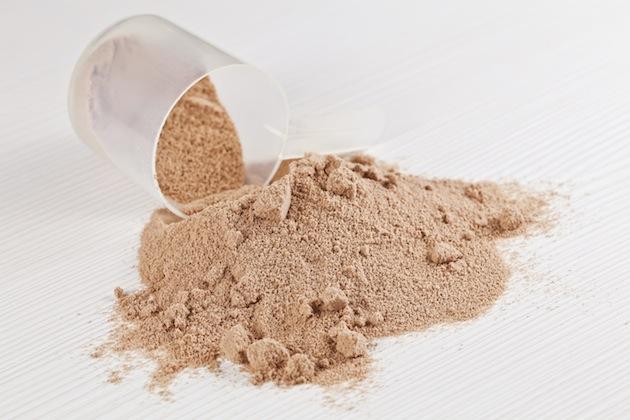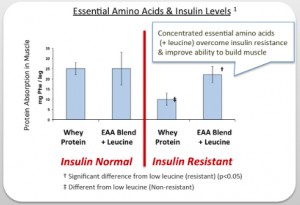By: Dr. Sally Machin
**[If you have type 2 diabetes, make sure to talk to your doctor before adding ANY type of protein powder. Kidney disease is one of the complications of later stage diabetes and can make it dangerous to consume too much protein.]
Protein powders are a way to supplement the healthy diet you are already eating. They can be especially important for those with high activity levels, or certain conditions, such as diabetes, pre-diabetes/dysglycemia and insulin resistance. Lean muscle mass is an important regulator of metabolism and those with impaired blood sugar control are faced with more of a challenge in building this muscle. The reason for this challenge is insulin resistance. I’ll start by explaining insulin resistance and how type 2 diabetes effects muscle growth then we can circle back to why, when, and how protein powders (and which ones specifically – spoiler alert: BCAAs containing formulas appear to be best) can be most beneficial for individuals with type 2 diabetes.
Insulin is an important chemical signal in our bodies that tells cells to draw glucose into them so they can use the glucose as energy to fuel cellular functions. In the bodies of people with insulin resistance, the receptor for the insulin signal does not respond as well, so cells have trouble using the glucose provided to them. Because of this, the glucose left in circulation is elevated, which is why we say that people with diabetes or pre-diabetes have high blood sugar. Muscle cells not only require this insulin signal to allow them to use glucose for energy, it also is a signal that there is energy available for muscle building. That means when insulin resistance is present, it is more difficult to build muscle mass because the cells aren’t getting a strong signal that there is energy available for them to use. This absolutely does not mean that it’s time to give up on building muscle if have problems with glucose/insulin metabolism! Building muscle and exercising is especially important if you fall into this group, to help increase resting metabolism and fat loss and improve insulin sensitivity. We just need to strategize differently to help the process along of building muscle mass. This is where protein powders can come into play.
Providing the right type of protein that is easily accessible for your muscles to use following resistance exercises increases the likelihood of muscle growth. Whey, which is a protein that comes from dairy, is commonly used as a protein supplement, and it does work well to increase the growth of muscles in the typical person. However, when you bring insulin resistance into the mix, there may be a better solution: BCAAs. Leuine, Isoleucine, and valine are the branched-chain amino acids, commonly referred to as BCAAs. Amino acids are the building blocks of proteins in our bodies. BCAAs are part of the list of essential amino acids, meaning that the human body cannot make them out of other compounds. One of the reasons that whey is helpful for building muscle is that as far as proteins go, it has a good amount of BCAAs. Some clinical trials have shown that using BCAAs on their own increases muscle production significantly more that using whey alone. Think about it: your body is given a higher concentration of BCAAs when taking them alone AND no need to spend time breaking down the whey protein into the BCAAs (and other amino acids) before your body can use them.
The bar graph below shows a comparison of protein absorption in muscles using whey protein or an essential amino acid blend with extra leucine (one of the BCAAs).
As you can see, there is a significant increase in protein absorption using the essential amino acid blend plus leucine in individuals with insulin resistance. Using a protein powder with added BCAAs improves anabolic potential of muscles – that means there is increased potential for muscle growth. It also stimulates the function of insulin resistance muscles. These are excellent reasons for using branched-chain amino acids as a protein source if you are insulin resistant.
Not sure if you’re insulin resistant? A normal fasting blood glucose does not mean that you are not developing insulin resistance – a simple fasting insulin blood test can tell you!
1. AM. J. Clin. Nutr. 2003; 78:250
2. Nagata C et al. Branched-chain Amino Acid intake and the Risk of Diabetes in a Japanese Community. The Takayama Study. Am J Epid. 2013, 178, 8, 1226-1232. 19
3. Borsheim E, et al. Effect of amino acid aupplementation on muscle mass, strength and physical function in elderly Clin Nutr. 2008, 27(2): 189-195.d
4. Claessens M. et al., Effect of different protein hydrolysate/carbohydrate mixtures on postprandial glucagon & insulin responses in healthy subjects. Eur. J Cli Nutr. 2009, 63, 48-56.


